【中考夺分天天练】2015届中考英语(人教版)总复习 第一篇 基础巧过关 :八年级下册 [Units 9—10](共37张PPT)
文档属性
| 名称 | 【中考夺分天天练】2015届中考英语(人教版)总复习 第一篇 基础巧过关 :八年级下册 [Units 9—10](共37张PPT) |  | |
| 格式 | zip | ||
| 文件大小 | 33.2KB | ||
| 资源类型 | 教案 | ||
| 版本资源 | 牛津上海版(全国版) | ||
| 科目 | 英语 | ||
| 更新时间 | 2014-12-05 06:36:06 | ||
图片预览

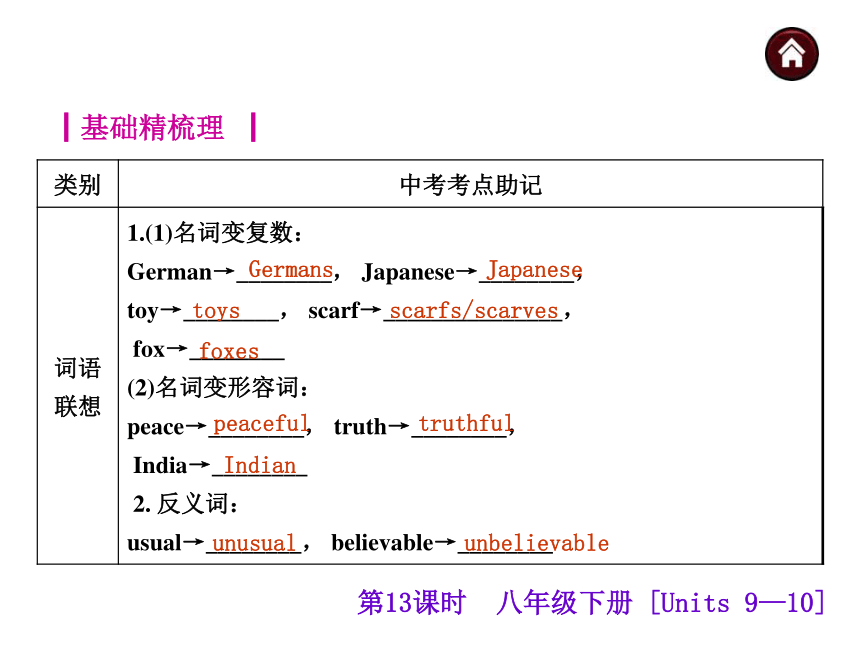
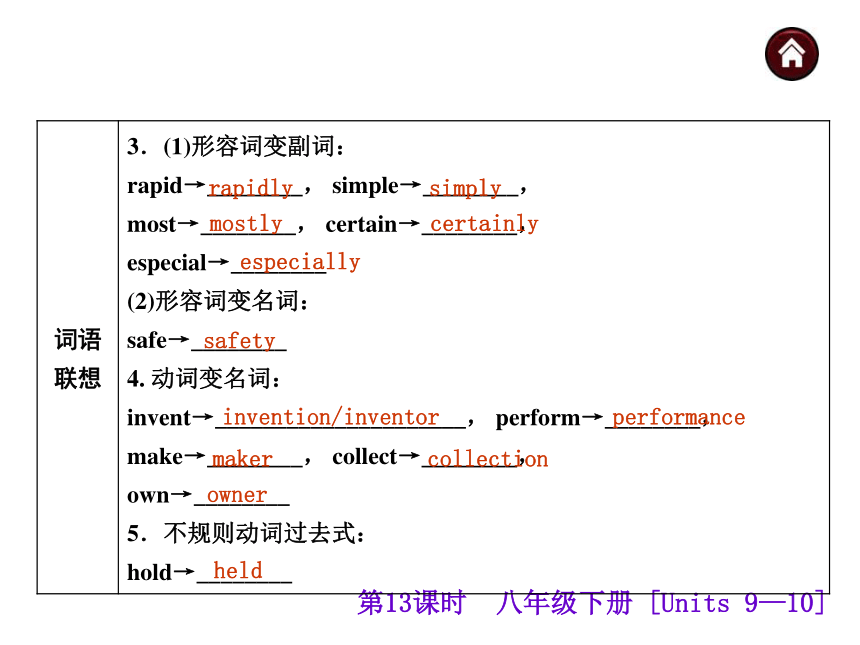
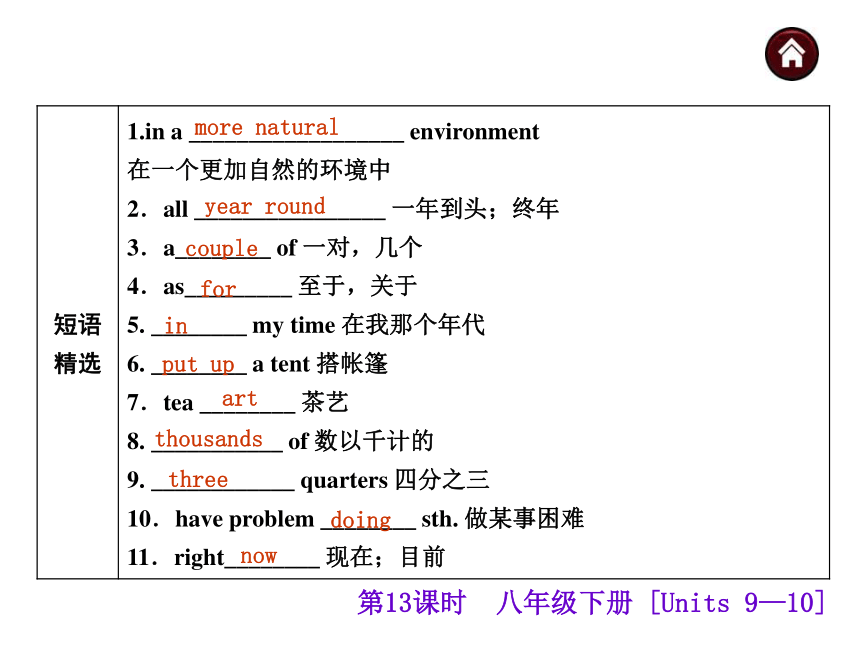
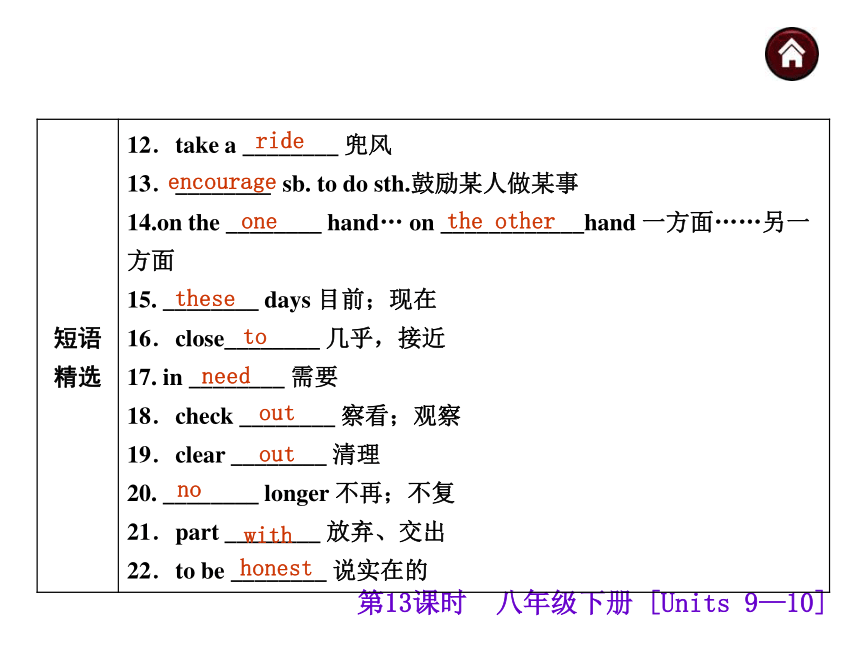
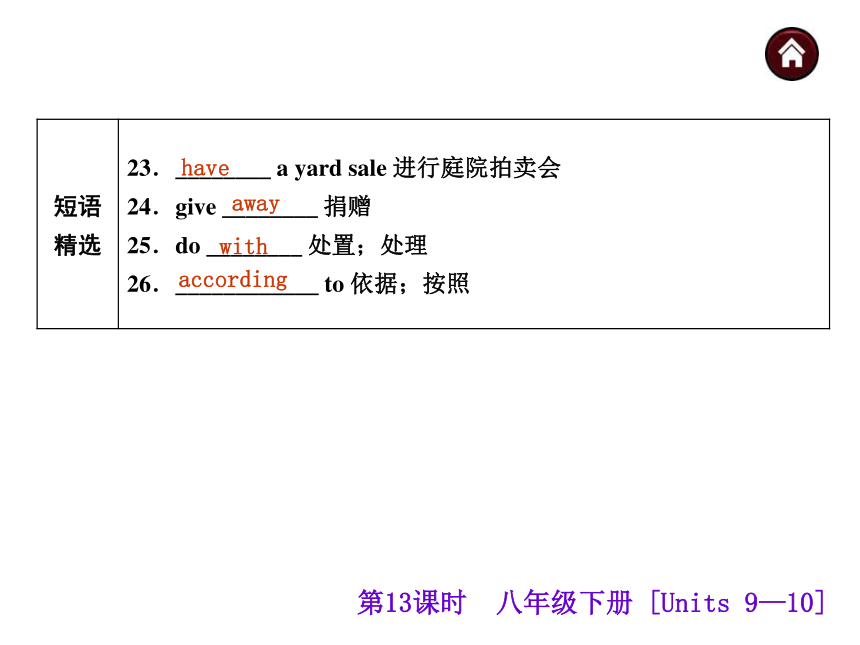
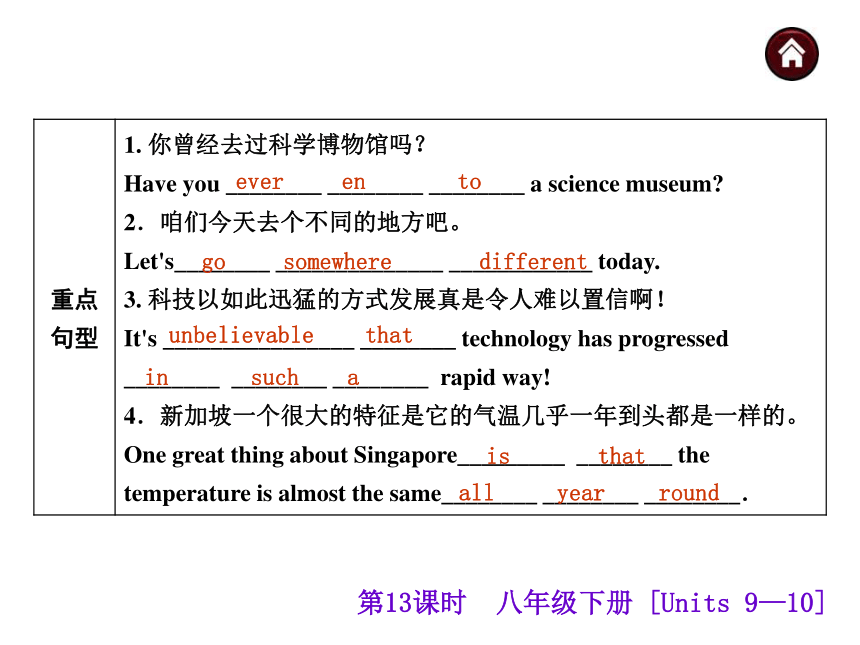
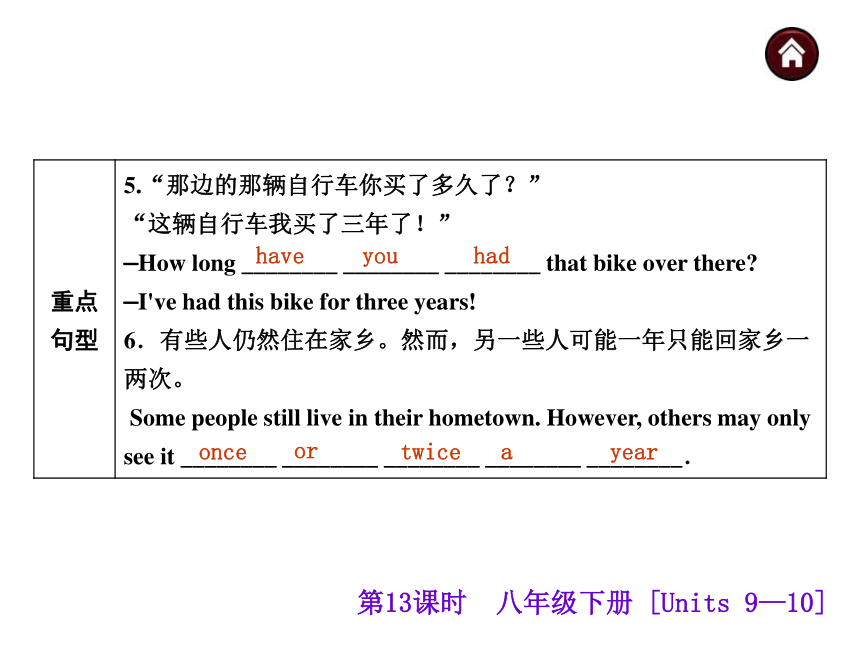
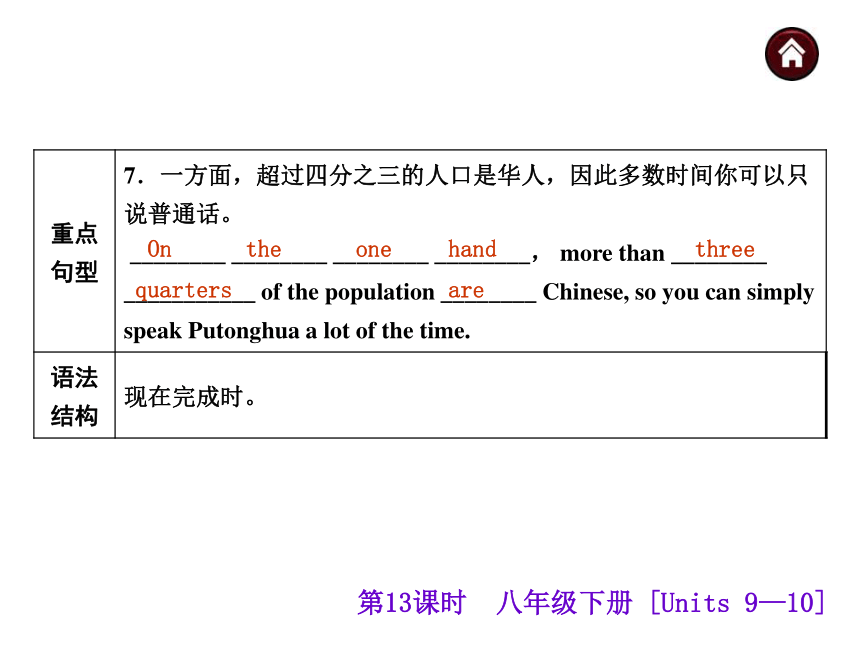
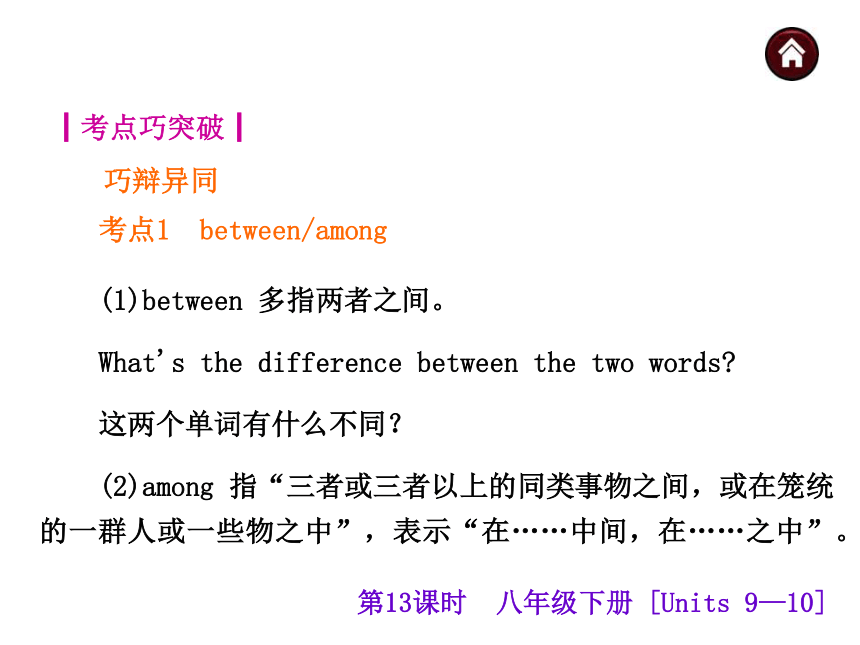
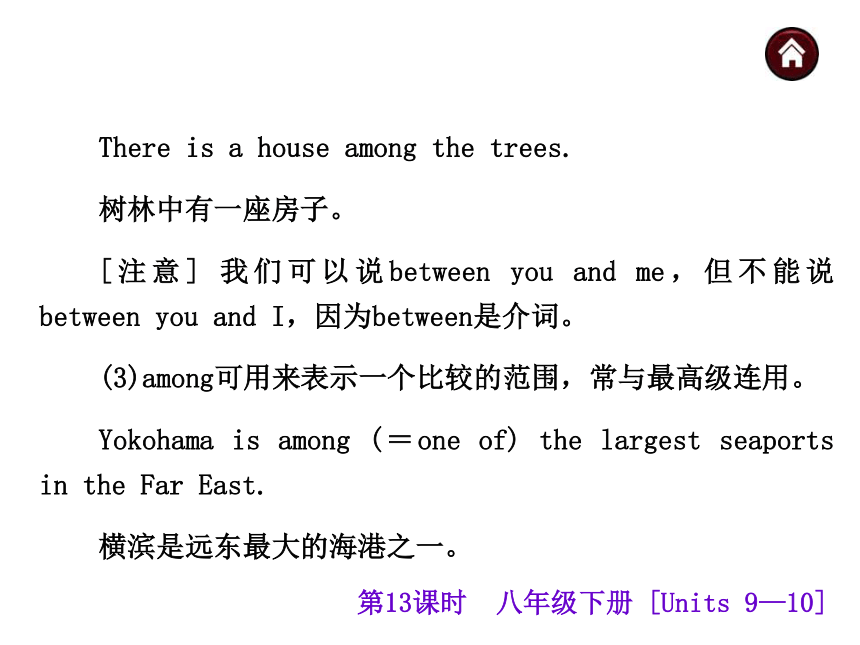
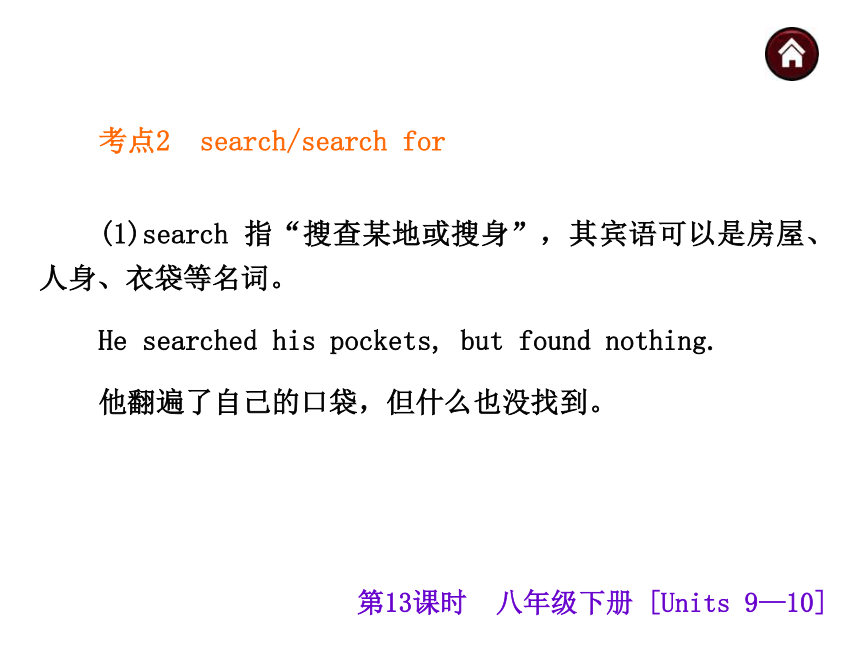
文档简介
课件37张PPT。第13课时 八年级下册 [Units 9—10]第13课时 八年级下册 [Units 9—10]┃基础精梳理 ┃Germans Japanesetoysscarfs/scarvesfoxespeacefultruthfulIndianunusualunbelievable第13课时 八年级下册 [Units 9—10]rapidlysimplymostlycertainlyespeciallysafetyinvention/inventorperformancemakercollectionownerheld第13课时 八年级下册 [Units 9—10]more naturalyear roundcoupleforinput upartthousandsthreedoingnow第13课时 八年级下册 [Units 9—10]rideencourageonethe otherthesetoneedoutoutnowithhonest第13课时 八年级下册 [Units 9—10]haveawaywithaccording第13课时 八年级下册 [Units 9—10]everentogo somewhere differentunbelievablethatin suchaisthatallyearround第13课时 八年级下册 [Units 9—10]haveyouhadonceortwiceayear第13课时 八年级下册 [Units 9—10]Ontheone handthreequartersare第13课时 八年级下册 [Units 9—10]┃考点巧突破┃考点1 between/among 巧辩异同(1)between 多指两者之间。
What's the difference between the two words?
这两个单词有什么不同?
(2)among 指“三者或三者以上的同类事物之间,或在笼统的一群人或一些物之中”,表示“在……中间,在……之中”。第13课时 八年级下册 [Units 9—10]There is a house among the trees.
树林中有一座房子。
[注意] 我们可以说between you and me,但不能说 between you and I,因为between是介词。
(3)among可用来表示一个比较的范围,常与最高级连用。
Yokohama is among (=one of) the largest seaports in the Far East.
横滨是远东最大的海港之一。第13课时 八年级下册 [Units 9—10]考点2 search/search for (1)search 指“搜查某地或搜身”,其宾语可以是房屋、人身、衣袋等名词。
He searched his pockets, but found nothing.
他翻遍了自己的口袋,但什么也没找到。第13课时 八年级下册 [Units 9—10](2)search for 指“搜寻、搜索某人或某物”。search后还可接要搜查的地方,即search…for sth./sb.,意为“在某处搜寻某物/人”。
They are searching for his clothes.
他们在搜寻他的衣服。
I searched everywhere for the book.
我到处找那本书。第13课时 八年级下册 [Units 9—10]考点3 have gone to/have been to/have been in (1)have gone to 意为“已经去了某地”,强调到现在还没回来。
They have gone to America.
他们去美国了。(说明到现在还没回来,说话的时候“他们”并不在身边。) 第13课时 八年级下册 [Units 9—10](2)have been to 意为“曾经去过某地”,强调现在已经回来了。
She has been to the desert.
她去过沙漠了。(说明说话的时候她已经回来了。)第13课时 八年级下册 [Units 9—10](3)have been in 意为“在某地”,强调到现在为止还在某地。
John has been in Shanghai for three weeks.
约翰已经在上海三周了。(说明说话的时候他已经到了上海,而且现在还在上海。)
(4)这三个短语若后面接副词,则去掉介词to或者in。 第13课时 八年级下册 [Units 9—10]句型点击考点1 On the one hand, more than three quarters of the population are Chinese, so you can simply speak Putonghua a lot of the time. 一方面,超过四分之三的人口是华人,因此多数时间你可以只说普通话。第13课时 八年级下册 [Units 9—10][点拨] three quarters意为“四分之三”,也可表示为“three fourths”。分数表达法:分子用基数词,分母用序数词,分子大于一时,分母序数词加“s”。“分数+名词”在句中作主语时,谓语动词的数与名词保持一致。
One sixth of the students are going for a trip tomorrow. 六分之一的学生明天将去旅行。
Three fifths of the information is written in English. 五分之三的信息是用英语写的。第13课时 八年级下册 [Units 9—10]考点2 I've had this bike for three years. 这辆自行车我买了三年了。 [点拨] 此句中的had意为“买”。buy是短暂性动词,不可以接时间段;若要接时间段,则要改为延续性动词have。
He has bought the book for two weeks. (×)
He has had the book for two weeks. (√)
他买了这本书两周了。第13课时 八年级下册 [Units 9—10][注意] (1)延续性动词可以与表示时间段的状语连用,非延续性动词在肯定句中不可以与表示时间段的状语连用。
(2)常见的延续性动词与非延续性动词之间的转换:leave—be away, borrow—keep, buy—have, begin/start—be on, die—be dead, finish—be over, come here—be here, go there—be there, become—be, come back—be back, fall asleep—be asleep, get to/arrive in/arrive at/reach—be in。
第13课时 八年级下册 [Units 9—10]┃智能双提升┃基础过关Ⅰ.单词拼写
根据首字母及汉语提示,完成下列单词的拼写,使句意明确,语言通顺。
1. It's not u________(不同寻常的) for the young men to finish the hard work in such a short time.
2. Many foreigners are surprised at the r________(快速的) development of China during recent years.nusualapid第13课时 八年级下册 [Units 9—10]3. For c________ (某种) reason, Mr. Li left there without saying anything.
4. The boy is clever. He can c________ (数数) from 1 to 100.
5. I returned to my h________ (故乡) in the spring of last year.ertainountometown第13课时 八年级下册 [Units 9—10]Ⅱ.单项填空
1. —Tom has a toothache.
—He shouldn't eat too much ________ food.
A. delicious B. sweet C. expensive D. healthy
B根据常识判断牙疼应该是吃太多“甜的”食物造成的。故选B。第13课时 八年级下册 [Units 9—10]2. I love the countryside, ________ in spring.
A. instead B. hardly
C. especially D. heavilyC第13课时 八年级下册 [Units 9—10]3. Sally ________ the box for her missing letter, but she didn't find it.
A. searched B. put
C. offered D. providedC第13课时 八年级下册 [Units 9—10]4. —You have a nice watch!
—Thank you. I ________ it since I got married.
A. had B. bought
C. have had D. have boughtC句意:萨莉把盒子翻遍了寻找她丢失的信件,但是她没有找到它。search sb. (sth.) for指“搜查某人或某处以寻找……”。第13课时 八年级下册 [Units 9—10]5. These songs are very popular ________ young people.
A. between B. in C. among D. duringamong指“三者或三者以上之间”。C第13课时 八年级下册 [Units 9—10]1.[2013·鞍山] Jessica's parents always encourage her ________ out her opinions.
A. speak B. speaking
C. to speak D. will speak中考透视C第13课时 八年级下册 [Units 9—10]2.[2014·安徽] Rose finished her study in the university and went to ________ a good job.
A. take after B. look after
C. care for D. search for
D考查动词短语辨析。句意:罗丝大学毕业了, 于是去寻找好工作了。take after意为“像”;look after意为“照顾”;care for意为“照顾”;search for意为“寻找”。D项符合语境。第13课时 八年级下册 [Units 9—10]3.[2014·成都] ________I am in trouble, my classmates will help me out.
A. Before B. Whenever C. AlthoughB考查连词的用法。句意:无论何时我有困难, 我的同学们都会帮助我。before意为“在……之前”;whenever意为“无论何时”;although意为“尽管”。根据句意可知选B。第13课时 八年级下册 [Units 9—10]4.[2013·齐齐哈尔改编] —I'm sorry, Mr. Li. I ________ my English homework at home.
—Don't forget ________ it to school tomorrow.
A. left; to bring B. forgot; to take
C. lost; to bring D.left; to takeA第13课时 八年级下册 [Units 9—10]5.[2013·东营] —Did you go to Kenli during the Peach Blossom Festival (桃花节)?
—Yes. The flowers were beautiful. Bees were flying ________ them.
A. in B. among C. between D. throughB第13课时 八年级下册 [Units 9—10]6.[2014·江西] Some students want to go camping. Some students like fishing. But ________ me, the most important thing is to enjoy ourselves and have fun.
A. as for B. thanks to C. instead of D. such asA考查短语辨析。as for意为“至于,关于”;thanks to意为“由于,幸亏”;instead of意为“代替”;such as意为“比如”。根据语境和转折连词but可知答案为A。第13课时 八年级下册 [Units 9—10]7.[2014·滨州] The song I Believe I Can Fly tells us that believing in ________ is very important.
A. themselves B. itself
C. ourselves D. yourselvesC考查反身代词的用法。句意:歌曲《我相信我会飞》告诉我们,相信我们自己是很重要的。根据句中的us可知此处应用ourselves。故答案选C。第13课时 八年级下册 [Units 9—10]8. [2014·遵义改编] It is very cool in Guizhou in summer, so________ people come here for vacations.
A.two thousands B.thousands of
C.thousand of D.two thousands ofB第13课时 八年级下册 [Units 9—10]9. [2014·陕西] I had ________ unusual day on my last school trip.
A. a B. an
C./ D. theB考查冠词的用法。句意:在上次学校郊游中, 我度过了不寻常的一天。泛指“不寻常的一天”用不定冠词, unusual以元音音素开头,所以用an。故选B。第13课时 八年级下册 [Units 9—10]10. [2014·昆明] Teenagers should be encouraged to go________ and be close to nature.
A. inside B. back
C. outside D. offC
What's the difference between the two words?
这两个单词有什么不同?
(2)among 指“三者或三者以上的同类事物之间,或在笼统的一群人或一些物之中”,表示“在……中间,在……之中”。第13课时 八年级下册 [Units 9—10]There is a house among the trees.
树林中有一座房子。
[注意] 我们可以说between you and me,但不能说 between you and I,因为between是介词。
(3)among可用来表示一个比较的范围,常与最高级连用。
Yokohama is among (=one of) the largest seaports in the Far East.
横滨是远东最大的海港之一。第13课时 八年级下册 [Units 9—10]考点2 search/search for (1)search 指“搜查某地或搜身”,其宾语可以是房屋、人身、衣袋等名词。
He searched his pockets, but found nothing.
他翻遍了自己的口袋,但什么也没找到。第13课时 八年级下册 [Units 9—10](2)search for 指“搜寻、搜索某人或某物”。search后还可接要搜查的地方,即search…for sth./sb.,意为“在某处搜寻某物/人”。
They are searching for his clothes.
他们在搜寻他的衣服。
I searched everywhere for the book.
我到处找那本书。第13课时 八年级下册 [Units 9—10]考点3 have gone to/have been to/have been in (1)have gone to 意为“已经去了某地”,强调到现在还没回来。
They have gone to America.
他们去美国了。(说明到现在还没回来,说话的时候“他们”并不在身边。) 第13课时 八年级下册 [Units 9—10](2)have been to 意为“曾经去过某地”,强调现在已经回来了。
She has been to the desert.
她去过沙漠了。(说明说话的时候她已经回来了。)第13课时 八年级下册 [Units 9—10](3)have been in 意为“在某地”,强调到现在为止还在某地。
John has been in Shanghai for three weeks.
约翰已经在上海三周了。(说明说话的时候他已经到了上海,而且现在还在上海。)
(4)这三个短语若后面接副词,则去掉介词to或者in。 第13课时 八年级下册 [Units 9—10]句型点击考点1 On the one hand, more than three quarters of the population are Chinese, so you can simply speak Putonghua a lot of the time. 一方面,超过四分之三的人口是华人,因此多数时间你可以只说普通话。第13课时 八年级下册 [Units 9—10][点拨] three quarters意为“四分之三”,也可表示为“three fourths”。分数表达法:分子用基数词,分母用序数词,分子大于一时,分母序数词加“s”。“分数+名词”在句中作主语时,谓语动词的数与名词保持一致。
One sixth of the students are going for a trip tomorrow. 六分之一的学生明天将去旅行。
Three fifths of the information is written in English. 五分之三的信息是用英语写的。第13课时 八年级下册 [Units 9—10]考点2 I've had this bike for three years. 这辆自行车我买了三年了。 [点拨] 此句中的had意为“买”。buy是短暂性动词,不可以接时间段;若要接时间段,则要改为延续性动词have。
He has bought the book for two weeks. (×)
He has had the book for two weeks. (√)
他买了这本书两周了。第13课时 八年级下册 [Units 9—10][注意] (1)延续性动词可以与表示时间段的状语连用,非延续性动词在肯定句中不可以与表示时间段的状语连用。
(2)常见的延续性动词与非延续性动词之间的转换:leave—be away, borrow—keep, buy—have, begin/start—be on, die—be dead, finish—be over, come here—be here, go there—be there, become—be, come back—be back, fall asleep—be asleep, get to/arrive in/arrive at/reach—be in。
第13课时 八年级下册 [Units 9—10]┃智能双提升┃基础过关Ⅰ.单词拼写
根据首字母及汉语提示,完成下列单词的拼写,使句意明确,语言通顺。
1. It's not u________(不同寻常的) for the young men to finish the hard work in such a short time.
2. Many foreigners are surprised at the r________(快速的) development of China during recent years.nusualapid第13课时 八年级下册 [Units 9—10]3. For c________ (某种) reason, Mr. Li left there without saying anything.
4. The boy is clever. He can c________ (数数) from 1 to 100.
5. I returned to my h________ (故乡) in the spring of last year.ertainountometown第13课时 八年级下册 [Units 9—10]Ⅱ.单项填空
1. —Tom has a toothache.
—He shouldn't eat too much ________ food.
A. delicious B. sweet C. expensive D. healthy
B根据常识判断牙疼应该是吃太多“甜的”食物造成的。故选B。第13课时 八年级下册 [Units 9—10]2. I love the countryside, ________ in spring.
A. instead B. hardly
C. especially D. heavilyC第13课时 八年级下册 [Units 9—10]3. Sally ________ the box for her missing letter, but she didn't find it.
A. searched B. put
C. offered D. providedC第13课时 八年级下册 [Units 9—10]4. —You have a nice watch!
—Thank you. I ________ it since I got married.
A. had B. bought
C. have had D. have boughtC句意:萨莉把盒子翻遍了寻找她丢失的信件,但是她没有找到它。search sb. (sth.) for指“搜查某人或某处以寻找……”。第13课时 八年级下册 [Units 9—10]5. These songs are very popular ________ young people.
A. between B. in C. among D. duringamong指“三者或三者以上之间”。C第13课时 八年级下册 [Units 9—10]1.[2013·鞍山] Jessica's parents always encourage her ________ out her opinions.
A. speak B. speaking
C. to speak D. will speak中考透视C第13课时 八年级下册 [Units 9—10]2.[2014·安徽] Rose finished her study in the university and went to ________ a good job.
A. take after B. look after
C. care for D. search for
D考查动词短语辨析。句意:罗丝大学毕业了, 于是去寻找好工作了。take after意为“像”;look after意为“照顾”;care for意为“照顾”;search for意为“寻找”。D项符合语境。第13课时 八年级下册 [Units 9—10]3.[2014·成都] ________I am in trouble, my classmates will help me out.
A. Before B. Whenever C. AlthoughB考查连词的用法。句意:无论何时我有困难, 我的同学们都会帮助我。before意为“在……之前”;whenever意为“无论何时”;although意为“尽管”。根据句意可知选B。第13课时 八年级下册 [Units 9—10]4.[2013·齐齐哈尔改编] —I'm sorry, Mr. Li. I ________ my English homework at home.
—Don't forget ________ it to school tomorrow.
A. left; to bring B. forgot; to take
C. lost; to bring D.left; to takeA第13课时 八年级下册 [Units 9—10]5.[2013·东营] —Did you go to Kenli during the Peach Blossom Festival (桃花节)?
—Yes. The flowers were beautiful. Bees were flying ________ them.
A. in B. among C. between D. throughB第13课时 八年级下册 [Units 9—10]6.[2014·江西] Some students want to go camping. Some students like fishing. But ________ me, the most important thing is to enjoy ourselves and have fun.
A. as for B. thanks to C. instead of D. such asA考查短语辨析。as for意为“至于,关于”;thanks to意为“由于,幸亏”;instead of意为“代替”;such as意为“比如”。根据语境和转折连词but可知答案为A。第13课时 八年级下册 [Units 9—10]7.[2014·滨州] The song I Believe I Can Fly tells us that believing in ________ is very important.
A. themselves B. itself
C. ourselves D. yourselvesC考查反身代词的用法。句意:歌曲《我相信我会飞》告诉我们,相信我们自己是很重要的。根据句中的us可知此处应用ourselves。故答案选C。第13课时 八年级下册 [Units 9—10]8. [2014·遵义改编] It is very cool in Guizhou in summer, so________ people come here for vacations.
A.two thousands B.thousands of
C.thousand of D.two thousands ofB第13课时 八年级下册 [Units 9—10]9. [2014·陕西] I had ________ unusual day on my last school trip.
A. a B. an
C./ D. theB考查冠词的用法。句意:在上次学校郊游中, 我度过了不寻常的一天。泛指“不寻常的一天”用不定冠词, unusual以元音音素开头,所以用an。故选B。第13课时 八年级下册 [Units 9—10]10. [2014·昆明] Teenagers should be encouraged to go________ and be close to nature.
A. inside B. back
C. outside D. offC
